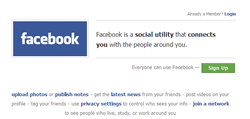My son is always telling me that I ‘buck the trend’ when it comes to my interest in technology (as a baby boomer I should add, I joined Facebook well before he had even heard about it). However I am a bit short of friends -(not that I’m complaining)- while his ‘friends’ run into the hundreds, mine number only 39. But what more can you expect from a baby boomer— and a new study is now asserting that social network sites should be ‘designed’ to better meet the needs of us 55-65-year-old people. Researchers at Helsinki Institute for Information Technology HIIT found out that many baby-boomers think social network sites like Facebook are unfit to them. This is the reason why so few of them use any social network services on the net. [continue reading…]
 Judging a book by its cover may be unwise, but online profiles are fair game, new research suggests. University students considered likeable by people that met them in real life have been found to make a similar impression on people who view their Facebook profiles.
Judging a book by its cover may be unwise, but online profiles are fair game, new research suggests. University students considered likeable by people that met them in real life have been found to make a similar impression on people who view their Facebook profiles.
“People who were expressive in tone of voice and facial expression were also socially expressive on Facebook. They posted a lot of pictures, they posted photo albums, they seemed to have a lot of conversations with people,” says Max Weisbuch, a psychologist at Tufts University in Medford, Massachusetts who led the study. link to continue
reading
Source:New Scientist; Journal reference: Journal of Experimental Social Psychology (DOI: 10.1016/j.esp.2008.12.009)
News in mid-April of an unpublished study suggesting that college students’ use of Facebook was related to lower college academic achievement probably sent more than a few parents reeling. Now a new study may allay parental concern. [continue reading…]
 Here’s another tweet amongst the growing Twitter posts pile: Rapid-fire media may confuse your moral compass!
Here’s another tweet amongst the growing Twitter posts pile: Rapid-fire media may confuse your moral compass!
Emotions linked to our moral sense awaken slowly in the mind, according to a new study from a neuroscience group led by corresponding author Antonio Damasio, director of the Brain and Creativity Institute at the University of Southern California.
The finding, contained in one of the first brain studies of inspirational emotions in a field dominated by a focus on fear and pain, suggests that digital media culture may be better suited to some mental processes than others. [continue reading…]
